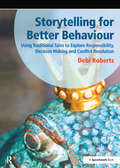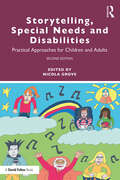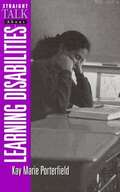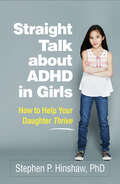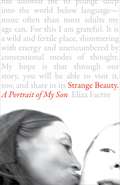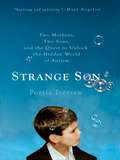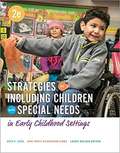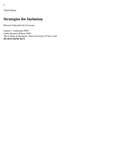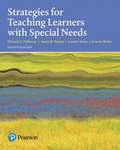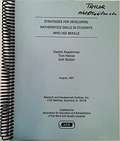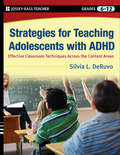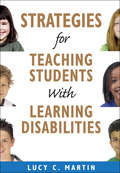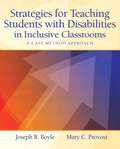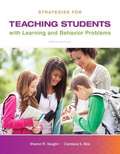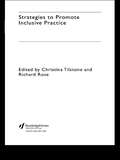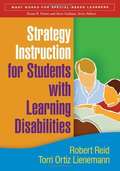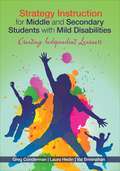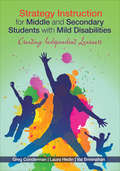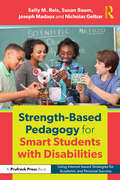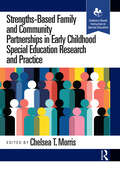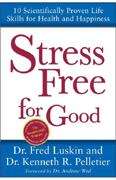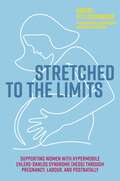- Table View
- List View
Storytelling for Better Behaviour: Using Traditional Tales to Explore Responsibility, Decision Making and Conflict Resolution
by Debi RobertsUsing Traditional Tales to Explore Responsibility, Decision Making and Conflict Resolution provides a method to teach students to reflect, consider and think in ways that can enhance the potential they have for making good decisions and resolving conflicts peacefully. The book provides a series of thinking tools, incorporating both graphic organisers and concept maps and are part of a thinking process known as Theory of Constraint. As well as an approach to conflict resolution, the student programme incorporating over 35 sessions, helps develop emotional literacy. The programme will help students: increase ability to empathise; improve language and communication skills; develop an understanding of conflict in terms of win-win rather than win-lose; and realise behaviour is a choice and that actions have consequences. There are comprehensive facilitator notes for all of the sessions with student PowerPoint slides to reinforce the teaching points. The CD ROM has all the student activity sheets, student PowerPoint as well as a staff development PowerPoint and a Glossary of Terms. Suitable for ages: 7 - 18.
Storytelling, Special Needs and Disabilities: Practical Approaches for Children and Adults
by Nicola GroveNow in a fully revised and updated second edition, this innovative and wide-ranging book shows how storytelling can open new worlds for individuals with special educational needs and disabilities. Providing a highly accessible combination of theory and practice, the contributors to this book define their own approaches to inclusive storytelling, describing the principles and theory that underpin their practice, whilst never losing sight of the joy at the heart of their work. Topics include therapeutic storytelling; language and communication; interactive and multi-sensory storytelling; and technology. Each chapter includes top tips, and signposts further training for practitioners who want to start using stories in their own work, making this book a crucial and comprehensive guide to storytelling practice with diverse learners. This new edition: · has been fully updated to reflect the way in which this field of storytelling has grown and developed · uses a broad range of chapters, structured in a way that guides the reader through the conceptualisation of a storytelling approach towards its practical application · includes an additional chapter, sharing the lived experiences of storytellers who identify as having a disability. Full of inspiring ideas to be used with people of all ages and with a range of needs, this book will be an invaluable tool for education professionals, as well as therapists, youth workers, counsellors and theatre practitioners working in special education.
Straight Talk About Learning Disabilities
by Kay Marie PorterfieldStraight Talk About Learning Disabilities provides information and suggestions of ways to get help for those who think they may have a LD or know someone whom they think has a LD. The author includes a moving preface in which she discusses her own experiences, in school and after graduation, with LDs. A list of agencies to contact for help or additional information is included.
Straight Talk about ADHD in Girls: How to Help Your Daughter Thrive
by Stephen P. HinshawParenting a daughter with attention-deficit/hyperactivity disorder (ADHD) is no easy path--especially because of the myth that the disorder is rare to nonexistent in girls. From pioneering researcher Stephen P. Hinshaw, this empowering guide provides vital information and advice to help you understand and meet your daughter's needs. Dr. Hinshaw delivers up-to-date facts on what ADHD is, why symptoms often appear differently in girls than in boys, why girls with ADHD behave the way they do, how to get an accurate diagnosis, and what treatments are most effective. There is so much pressure on girls to be "perfect"--and for those with ADHD, it feels especially hard to measure up. Learn concrete steps you can take to support your daughter's success from preschool through high school and beyond, while nurturing her confidence and self-worth.
Stranded
by Ben MikaelsenTwelve-year-old Koby, who has lost a foot in an accident, sees a chance to prove her self-reliance to her parents when she tries to rescue two stranded pilot whales near her home in the Florida Keys.
Strange Beauty: A Portrait of My Son
by Eliza FactorA unique and hopeful story of how one woman and her family were transformed by her child's multiple disabilities and inability to talk and how she, in turn, transformed a community.This intimate, no-holds barred memoir shares one family's experiences with a child who is both autistic and physically disabled. It is a story of infectious laughter, blood on the floor, intense physical conflict, and of two little girls growing up in the shadow of their charming and fitful brother. And it is the story of a mother and writer and the illuminating effect of imagining the world through the eyes of her beautiful, charismatic, and nonverbal son, Felix. Felix and his sisters inspire Eliza to start Extreme Kids, a community center that connects families with children with disabilities through the arts and play, and transform how she saw herself and the world. She writes of the joy this project brings her, as well as the disconnect of being lauded for helping others at the same time that she cannot help her own son.As Felix grows bigger and stronger, his assaults against himself grow more destructive. When his bruised limbs and face prompt Child Services to investigate the Factors for abuse, Eliza realizes how dangerous her home has become.Strange Beauty is a personal story, but it shines a light on the combustible conditions many families are living in at this moment. The United States offers parents whose children are prone to violence very little help. That Eliza's story ends happily, with Felix thriving at Crotched Mountain School, is due more to luck than policy. There are few such schools and many such children. When children are violent, we fail to account for the internal and external pressures that lead to violence. This is both cruel and counterproductive, for people with disabilities have much to teach us, if we will only listen.
Strange Son
by Portia IversenThe uplifting true story of two mothers from opposite sides of the world united to help their sons. Portia Iversen's life was turned upside down when her two-year-old son Dov was diagnosed with autism. Desperate to find a treatment, Portia was shocked to learn that almost nothing was known about the disorder, which only a handful of researchers were studying. When Portia heard of a severely autistic nonverbal boy in India whose mother had taught him to read and write, she arranged for mother and son to visit the United States to help researchers understand what can be learned from their success. Soma Mukhopadhyay's achievement was truly astonishing: not only could her son Tito communicate, but he had an IQ of 185 and wrote beautiful poetry. Her revolutionary teaching method allowed Tito to explain the startling differences in his sensory perception, offering scientists an unrivaled window into the autistic mind. Part memoir, part detective story,Strange Sonis the captivating account of these families' extraordinary journeys, an inspiring tale of the power of two mothers' determination to find hope where there was once only despair.
Stranger on the Bay
by Adrien StoutenburgDon and ned are spending the summer trying to get Frosty a retired german Shepherd guide dog over his fear of fire. At the same time, a young and very quiet boy appears on the Bay claiming to be Grandpa Dan's long lost Grandsoon. But not all is what it seems. Who is living in the abadoned shack on the other side of the bay? Who is Mr. Blackwell, and why does Don get a bad feeling off of him. Is three something going on that they boys and even grandpa Dan don't realize. Good story, about guide dogs, but not about training of them. Good classic, but can be appreciated now as well.
Strategies For Including Children With Special Needs In Early Childhood Settings (Mindtap Course List)
by Ruth E. Cook Anne Marie Richardson-Gibbs Laurie NielsenThis practical, hands-on-guide encompasses workable ideas on how to include and support young children with disabilities in all preschool classrooms. Teaching strategies and adaptations are offered by program activity rather than by disability, so you can more easily coordinate adaptations to each part of your lesson plan. The main focus is on embedding instruction within daily routines. The text incorporates simple and direct language that builds on the foundation of information learned about children without disabilities. Chapters are short and include many examples for supporting children with a variety of common disabilities such as cerebral palsy, Down syndrome, autism, visual impairment, hearing loss, and behavioral challenges. Whether you're a student working in general or special education, you will find the strategies, helpful hints, and scenarios to be useful resources when accommodating children with special needs in your current or future classroom.
Strategies For Inclusion: Physical Education For Everyone
by Lauren J. Lieberman Cathy Houston-WilsonTransitioning students with disabilities into inclusive physical education environments is an important and sometimes challenging task. ButStrategies for Inclusion, Third Edition,makes that transition much smoother and better for all parties involved. Lots of New Resources and Material The latest edition of this popular adapted physical education text will empower you with the information and tools necessary to successfully include students with disabilities in your program.Strategies for Inclusionreflects the latest research and legislation, so you can be sure that your program is not only successful but also compliant with the goals and requirements of the Individuals with Disabilities Education Improvement Act. The text has retained and updated its instruction on assessing students, making placement decisions, developing and implementing individualized education plans (IEPs), and more. And it offers this completely new material:A new chapter on the referral, eligibility, and placement process, covering the nine steps required by lawAnew chapter on transition planningand how you can help students integrate into their communities after leaving schoolAnew section on Paralympic sportsand how they can be infused into your curriculumNew materialon functional behavioral assessments, behavior intervention plans, leadership opportunities, training techniques for peer tutors and paraeducators, and moreA newinclusion rating scalethat will help you rate how inclusive your classes are and show you areas for improvementAnew web resourcewith numerous useful toolsMore than double the number of teaching units(38 units, up from 17), giving you more options for inclusionThe new web resource offers fillable digital versions of all the modification checklists and rubrics in the book. You can save materials in order to build an IEP for each student. You can also access the materials on a mobile device to use them in the classroom or gym. In addition, the web resource has an interactive inclusion rating scale that allows you (or an administrator) to assess how you are doing at including all students in class activities. This handy tool calculates your total rating as you fill in the form. Finally, the web resource directs you to high-quality adaptation information available elsewhere online.
Strategies For Teaching Learners With Special Needs
by Edward A. Polloway James R. Patton Loretta Serna Jenevie W. BaileyThis widely popular text combines the work of authoritative experts to present the most comprehensive exploration of how to teach students with mild/high incidence disabilities, including learning disabilities, mild intellectual disabilities, emotional and behavioral disorders, and students experiencing learning problems in the general education classroom. With a focus on effective instructional practices that can be used in diverse, inclusive educational environments, and balanced coverage of elementary and secondary strategies, it presents the latest changes in the field and ensures currency and applicability to contemporary education for preservice and in-service teachers. <p><p> In addition to two chapters on general curriculum and instruction information (one new to this edition), the book also includes chapters on classroom and behavioral management, oral language instruction, reading, writing, mathematics, social studies, science, study skills, social and self-determination skills, applied academics, and career and transition considerations. The Enhanced Pearson eText features embedded videos, check your understanding quizzes, and interactive learning modules.
Strategies for Developing Mathematics Skills in Students who Use Braille
by Gaylen KappermanStrategies for Developing Mathematics Skills in Students who Use Braille
Strategies for Teaching Adolescents with ADHD
by Silvia L. DeruvoADHD expert offers help for teaching the content areas to students with attention problemsWritten by an expert in the field of ADHD, this important resource offers strategies to teach adolescents with ADHD across all core content areas: English Language Arts, Math, Science, and Social Studies. These strategies have been classroom-tested and proven to engage students during content instruction so that they will gain a lasting understanding of the material taught. As students interact with the content--talk, write, draw, and create a variety of media in relation to the content--all students, including those with ADHD, will learn the basics necessary for post-secondary education and employment.Offers an important guide for teaching core content to adolescents with ADHDIncludes information for engaging ADHD students in a way that makes content memorableExplains how to use the strategies to teach all classroom studentsWritten by a nationally known authority on ADHDPublished in partnership with the acclaimed WestEd organization
Strategies for Teaching Students With Learning Disabilities
by Lucy C. MartinWritten by a teacher for teachers, this engaging book provides more than 100 practical strategies for students with learning disabilities, along with guidance on accommodations and assessment.
Strategies for Teaching Students with Disabilities in Inclusive Classrooms: A Case Method Approach
by Joseph R. Boyle Mary C. ProvostCombining the best of concept and application, Strategies for Teaching Students in Inclusive Classrooms: A Case Method Approach covers teaching methods and cases from inclusive education settings. Offering an innovative chapter sequence, it pairs concept chapters with case chapters to ensure readers understand core material and can apply it to real situations. Learn about special education law and inclusion, teaching in the inclusive classroom, effective use of behavior management in inclusive classrooms and effective techniques for teaching basic skills such as reading, writing, and mathematics. See how strategies work in real classrooms through the text's clinical and narrative case studies that illustrate core concepts in action.
Strategies for Teaching Students with Learning and Behavior Problems,Ninth Edition
by Sharon Vaughn Candace S. BosFor courses in Mid/Moderate Disabilities Methods (Special Education); Methods for Students with Learning and Behavior Problems (Special Education) This bestselling text focuses on presenting the ideal content for preparing teachers to meet the needs of elementary and secondary students with learning and behavior problems in a variety of settings. Streamlined in the previous edition to provide more hands on applications and classroom strategies than any other methods text on the market, this new Ninth Edition presents fresh ideas and information on best practices through the use of embedded video clips, web links, and step-by-step instructional strategies. Featured in this edition are a new emphasis on and integration of the Common Core State Standards (CCSS) throughout; updated coverage of RtI; a new emphasis on higher level thinking, including reading comprehension and complex texts as well as problem solving, fractions, and algebra; increased focus on classroom management and positive behavior support; and updated and enhanced key research, practice opportunities, and strategies throughout.
Strategies to Promote Inclusive Practice
by Richard Rose Christina TilstoneThis book considers current issues in the development of policies to promote inclusive education for pupils with special educational needs. By examining issues from the perspective of individual pupils, schools, and local education authorities, it raises critical commentary on the ways forward for a co-ordinated approach to inclusion.Strategies to Promote Inclusive Practice draws upon the experience and expertise of teachers, policy makers, and researchers, who explore the many factors which need to be addressed in the development of a more inclusive education system. The authors explore the link between theoretical perspectives and the production of policy, as well as the potential for translating this into good classroom practice. They provide examples of approaches which have proved successful in enabling pupils to become better equipped to address the needs of a wide range of pupils. In considering the impact of recent policy, legislation, and research, the authors suggest that several models of inclusion may be necessary in order to become an inclusive education system.This book will be of interest to students, teachers, policy makers, and researchers, who are concerned to advance the debate on inclusion towards a more pragmatic approach to providing for all pupils with special needs. It is a companion text to Promoting Inclusive Practice edited by Christine Tilstone, Lani Florian and Richard Rose (RoutledgeFalmer, 1998), which was the joint winner of the 1999 TES/NASEN Academic Book Award.
Strategy Instruction For Students With Learning Disabilities
by Robert Reid Torri Ortiz LienemannA guide to cognitive strategy instruction, which has been shown to be one of the most effective instructional techniques for students with learning problems, this book presents strategies that are helpful for students to improve their self-regulated learning, study skills, and performance in specific content areas.
Strategy Instruction for Middle and Secondary Students With Mild Disabilities: Creating Independent Learners
by Laura R. Hedin Gregory Greg J. James Conderman Mary V. Valerie BresnahanTeach your students learning strategies that will last a lifetime! Beyond facts and figures, special educators must teach their students how to learn: a skill that will sustain them for a lifetime. Offering an innovative organization, this book explains strategies within context and features: The most effective ways to teach vocabulary, reading, written language, math, and science Instructional strategies known to improve study skills, textbook skills, and self-regulation Informal assessments for each content or skill Case studies that link assessment results, IEP goals, and learning strategies Ready-to-use forms, think-alouds, and application activities
Strategy Instruction for Middle and Secondary Students with Mild Disabilities: Creating Independent Learners
by Laura R. Hedin Gregory J. Conderman Mary V. BresnahanTeach your students learning strategies that will last a lifetime! Beyond facts and figures, special educators must teach their students how to learn: a skill that will sustain them for a lifetime. Offering an innovative organization, this book explains strategies within context and features: The most effective ways to teach vocabulary, reading, written language, math, and science Instructional strategies known to improve study skills, textbook skills, and self-regulation Informal assessments for each content or skill Case studies that link assessment results, IEP goals, and learning strategies Ready-to-use forms, think-alouds, and application activities
Strawgirl
by Abigail PadgettThis is Book 2 in the Bo Bradley mystery series. (The first book, "Child of Silence", is already in Bookshare collection.) Bo Bradley is a CPS worker who also has manic-depression. The characters are well-rounded, and the story keeps you guessing what might happen next. This one focuses on the death of a small child and many mistakes in the police's and public's choices of the guilty person. Satanic abuse is blamed and debunked, rituals and cults debunked, while Bradley and her cohorts track down the truly guilty person. A possibly-romantic attachment for Bradley is continued in this story, but not yet decided. A quick read, and not depressing, even with the subject matter of child abuse.
Strength-Based Pedagogy for Smart Students with Disabilities: Using Interest-based Strategies for Academic and Personal Success
by Sally M. Reis Joseph Madaus Nicholas Gelbar Susan BaumUsing the approach to teaching and developing strengths and talents known as the Schoolwide Enrichment Model (SEM) this book provides a blueprint on how to expand your repertoire of evidence-based practices and pedagogical strategies to better challenge and engage twice exceptional students. Covering topics such as how to provide various types of enrichment for the classroom, how to assess individual interests, how to use strength-based learning to promote socioemotional wellbeing, post-secondary transition, and more, this book offers practical advice, easily implemented strategies and real-life examples from evidence-based research to support educators in helping their students achieve both academic and personal success.Featuring various methods for providing various types of enrichment in the classroom as well as reproducible materials for immediate implementation, Strength-Based Pedagogy for Smart Students with Disabilities offers comprehensive assistance and support to educators and parents in their efforts to guide students and children toward academic and personal success.
Strengths-Based Family and Community Partnerships in Early Childhood Special Education Research and Practice (Evidence-Based Instruction in Special Education)
by Chelsea T. MorrisThis comprehensive edited collection provides early childhood education and early childhood special education providers and researchers with strengths-based strategies for young children in infant, toddler, and preschool settings. It focuses on meaningfully working with families and communities to promote children’s social, emotional, behavioral, and mental health well-being.Moving away from deficit-based views and reframing how educators and researchers can respond to behavior that is perceived as challenging, the book begins with an overview of family-centered practices, the negative impact of exclusionary discipline, and theoretical models for understanding behavior and partnerships. Then the chapters detail how to recognize and build on family and community strengths, reduce suspensions and expulsions, and promote strengths-based teacher training and research collaborations. The book also discusses research, practice, and policy approaches that support children with disabilities, emphasizing the importance of family and community in intervention processes.Strengths-Based Family and Community Partnerships in Early Childhood Special Education Research and Practice is key reading for early childhood professionals, pre-service teacher educators, and researchers.
Stress Free for Good: 10 Scientifically Proven Life Skills for Health and Happiness
by Fred Luskin Kenneth R. PelletierPlan for creating a life with less stress that can lead to better physical and emotional health. These 10 suggested skills were developed over many years that the authors spent doing research at Stanford University's school of medicine.
Stretched to the Limits: Supporting Women with Hypermobile Ehlers-Danlos Syndrome (hEDS) Through Pregnancy, Labour, and Postnatally
by Rachel Fitz-DesorgherOur increased knowledge and appreciation of hypermobile Ehlers-Danlos syndrome (hEDS) has been making headlines across medical research and practice. Stretched to the Limits is the first text to apply this new understanding directly to midwifery. The book details the effects of hEDS on the different bodily systems, and the implications for pregnancy, labour, birth and postnatally. Midwives and doulas are likely, at some point in their careers, to come across women with this most common sub-type. hEDS affects at least 1 in 5,000 women but they frequently find themselves on a care pathway more suitable for those with other, rarer, subtypes such as classic EDS (cEDS) or vascular EDS (vEDS). Additionally, much of the advice detailed here will also help to support the 20% of the population with more generalised hypermobility. This book is, therefore, essential reading for empowering midwives and doulas to feel confident in their understanding of hEDS, so that they can best inform and support their clients and colleagues with the most appropriate care. It will also provide a valuable resource for those with hEDS to share with their care team and advocate for their needs when planning pregnancy and birth.
